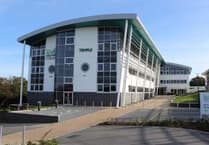A cancer-stricken Cornish schoolgirl given ‘no hope’ of recovery has been saved after doctors gave her a stem cell transplant using blood from a newborn baby’s umbilical cord.
Brave Sarah Marica, eight, was given the experimental treatment when chemotherapy and a bone marrow transplant failed to cure her acute myeloid leukaemia (AML).
She was diagnosed with the rare blood cancer at just four years-old and was not expected to pull through until she was selected for the trial procedure.
Doctors at Royal Manchester Children’s Hospital gave her a cord blood stem cell transplant, collected from the placenta and umbilical cord of a newborn baby.
And this helped to boost her cancer-fighting abilities when it was paired with a series of white blood cell transfusions, known as granulocytes.
Now over one year in remission, her emotional mum Simona Marica, 44, said doctors were hopeful she had been fully cured.
She said: “When I heard the doctor first diagnose Sarah with leukaemia I started crying at the word, but even worse, we were told this was a rare, harder to treat leukaemia.
“I knew this trial was her last chance of life.
“Sarah has been through so much over the last few years, but she has been so brave.
“She has been my rock and she is such a cheerful, determined girl who loves school and playing with her friends.
“As a result of this research, Sarah is now fully enjoying life. She is my inspiration, and this treatment has given us all our lives back.”
Sarah had multiple treatments when she was first diagnosed with AML, affecting roughly 100 children and young adults in the UK each year, in 2019. Her staff nurse mum Simona said she showed some initial signs of recovery, particularly after her brother David was able to offer her a bone marrow transplant.
But sadly her cancer returned each time, leaving her in a dangerous position with only a small chance of survival.
Simona said: “She had to start chemotherapy immediately as her blood results were so bad, she could have died at any time.
“After finishing six months of chemotherapy in Bristol, she went into remission, and we were going back to a kind of normal life.
“That was in 2019, but in February 2020 the leukaemia returned.
“She had more chemotherapy and fortunately our 10-year-old son David, was a bone marrow match and donated this to Sarah, who had stem cell transplant and went into remission for 18 months”.
Sarah was put forward for a pioneering course of cord blood stem cell transplant treatment – part of a trial at Royal Manchester Children’s Hospital (RMCH).
And Simona agreed that she should undertake the experimental procedure, knowing that this might be her final option.
She said: “As a nurse, I knew that nothing more could be done if the leukaemia came back again because her body would not be able to tolerate any more chemotherapy or further treatments.”
Professor Rob Wynn, director of the paediatric bone marrow transplant programme at RMCH, who helped treat Sarah said the study had shown “remarkable results”.
His team found that when white blood cells were given to patients after a transplant, the immune cells of the cord blood recovered more quickly.
And this then helped them fight off the deadly cancer in their body – as the cord blood is particularly rich with stem cells.
Children in the study were given seven white blood cell transfusions at around the time of their transplant, and Professor Wynn said this treatment saved Sarah’s life.
He said: “We know from our previous research, reported in the Blood Advances journal, that cord blood cells offer the most effective treatment for children with hard-to-treat blood cancer.
“Sarah is one of five children from our trial who are alive and in remission as a result of this effective, experimental treatment.
“Without this clinical trial, it is unlikely that any of the children would still be alive.”





Comments
This article has no comments yet. Be the first to leave a comment.